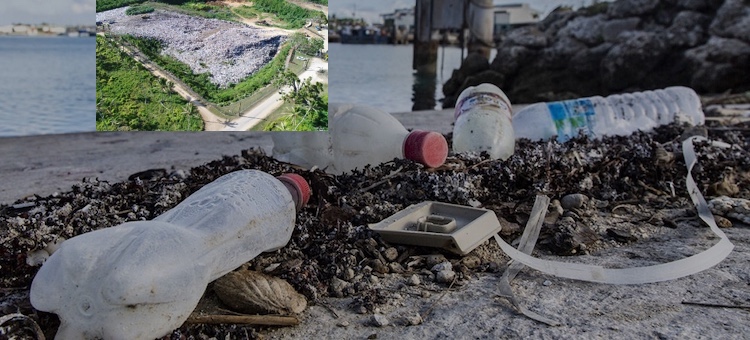By Fresh Polutele*
NUKU’ALOFA, Tonga, 23 June 2023 (IDN | Wansolwara) — The kingdom of Tonga in the middle of the South Pacific Ocean was known as a “paradise” island. But not anymore. Plastic and glass waste is an ongoing problem in Tonga’s environment and it has created a dilemma for the government.
How will the government address this issue? Does it need to ban plastic and glass materials or such goods from being imported to Tonga?
Tonga was well known to many tourists for its stunning natural beauty, pristine beaches, and rich cultural heritage but nowadays some tourists and peace corps volunteers—who were here before—has said that Tonga has really changed as villages, islands and other places that were used to be beautiful are now all completely a disaster with an acute waste problem.
This is due to the fact as they witness—some people dump their rubbish everywhere, especially at beaches and public areas. Plastic bags are very helpful to many people, but after people make use of them, they don’t put them in the right place like the rubbish bin.
Dr. Peter Suren, a professor from Germany who lived in Tonga 30 years ago, talked about the development he has noticed over the years compared to when he first visited Tonga in 1990.
“For us palangi foreigner—if we come here to Tonga and see all the plastic waste—we feel unwell. We think how can the people live here with their houses full of tins and whatever rubbish and then we feel unwell about it. Why? because now in the Western countries, we have the audacity to see plastic in a very bad light and we stop to produce plastic bags”, he told Wansolwara.
He has also noted, the issue is common among the Pacific islands and the region should work together to address this issue. “There must be something done this way to stop this problem—especially in the small islands,” Dr Suren added.
Tonga is made up of approximately 170 islands and atolls, with a total sea area of 700,000 square kilometers. Only 36 islands are inhabited, while the remainder is largely untouched. The kingdom’s population is only 106.017 according to the 2021 census.
In countries like Tonga, most of the population heavily rely on the ocean for their daily meals, but as years have gone by, there has been a decline in the marine species and their livelihood due to various reasons such as littering.
As such, the government and other organizations like the No Pelesitiki Campaign are working together in finding ways to solve these issues—such as recycling plastic and glass waste.
Eleni Tevi of the No Pelesitiki Campaign says that their campaign is not exclusive to picking up rubbish in coastal areas as they have now reached a milestone of transforming plastic into handicrafts for women to make earrings, dresses, handbags, and others.
“We are trying to teach women how to make use of plastic waste to make earrings, dresses, and handbags not only to help with their income but also to keep the environment and ocean free of plastic waste,” she said.
One of the ways to do so is the creation of the Taphuhia landfill—most of the concern is because the landfill is full of plastic as it makes up about 90% of the rubbish at Tapuhia. The landfill 11 km from the capital here is a former quarry and it was opened as a sanitary landfill in 2007.
Aid shipments after the January 2022 volcanic eruption have also added to the plastic waste problem. The kingdom received more than 200 shipments of aid supplies which included 86,000 plastic bottles of water. Most of these bottles ended up in the Taphuhia landfill.
Even though they have provided trash bins for the public to use, the Deputy Director of the Environment Department, Mafileó Masi says, it is a pity that people continue to litter on the beaches and the coastal areas today. “There are cleaning campaigns on the way and it is not enough to keep the beaches and coastal waters clean as people continue to litter,” she complains.
Masi adds: “There are also some people who use the beach for cleaning their meat products, especially beef, and leaving behind their plastic waste.”
The Department wishes to carry out a public awareness programme to remind them of the reasons and importance of keeping the environment clean and so stop littering.
“People should be aware of the significance of keeping the environment clean and safe from any plastic waste as it contains toxic chemicals which will harm the marine organism for a long period of time,” warns Masi.
Meanwhile, the Department of Environment is working on making a roadmap for the reusing of plastic waste as part of minimizing the littering of rubbish. Once it is completed—they will use it to find donors to fund their projects on the reusing of plastic waste.
However, the Department is urging the people to be more responsible as their actions will not only affect them—but will also affect a lot of people and the oceans’ living species.
The concern is that with such a huge amount of plastic waste, it harms the marine organism and affects the environment negatively.
* Fresh Polutele is a journalism student at the University of the South Pacific (USP) in Suva and this feature is transmitted as part of a contents exchange agreement between the university students’ newspaper Wansolwara and IDN-InDepthNews. [IDN-InDepthNews]
Collage: One time paradise (top left) turns to a plastic landfill. Credits: Pacific Regional Environment Programme and Wikimedia Commons.
IDN is the flagship agency of the Non-profit International Press Syndicate.
Visit us on Facebook and Twitter.
We believe in the free flow of information. Republish our articles for free, online or in print, under Creative Commons Attribution 4.0 International, except for articles that are republished with permission.

